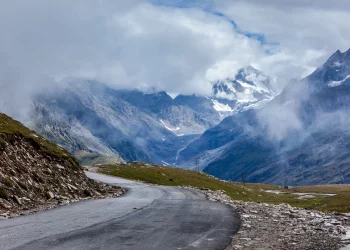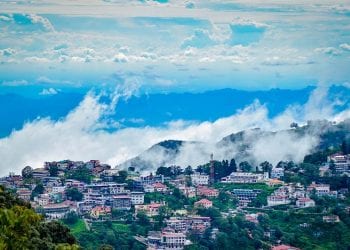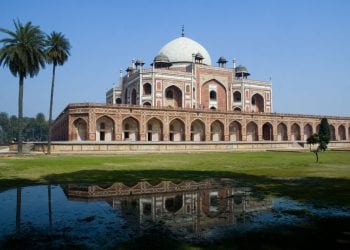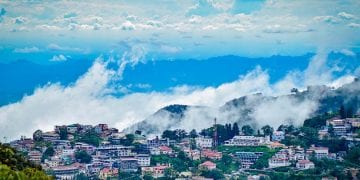Pocket Full of Sunshine – Jaipur
A mixture of rich culture, heritage and flavors – is something that aptly describes Jaipur. Pink City Jaipur is verbatim, a true identity to the varied diversity in India. Jaipur, Delhi and Agra are also noted as the Golden Triangle of the nation. Jaipur harbors copious amount of tourist attractions from all over the world in every season of the year. Being the largest city in Rajasthan, it evokes the princely reign of royal families that existed long ago
Amidst its stately street grid, stands the opulent complex of City Place. It was ranked the 7th best place in Asia by Travelers Readers Choice Survey conducted in 2018 and bagged the ‘best city to visit in India’ tag. Mazel Tow to Jaipur Tourism!
Magnificent forts, fairy festivals and tainted temples credit to the cause. It is also well – known for its grandeur in subjects of food. Rajasthani Thali is a must-try. The eclectic morsels served along with aesthetic condiments and taste make it an unforgettable memoir to take back with you.
Located in the semi-arid deserted land, approximately 400 meters above the sea level, it has a tropical and hot climate. There are only three distinct seasons in Rajasthan. One starts with scorching heat, unbearable and balmy hot spring-summer, followed by a brief but intense monsoon followed by dry yet warm winter.
The best time to visit Jaipur is winter during the months of November to January. However, it is highly recommended to pre-plan your tour beforehand. Here is a detailed version of Jaipur season-wise that will help you rule out the best time to book your tickets or more importantly when not to! Let’s get started!
Jaipur Summers
Summers in Jaipur is dreadful and sweltering. It starts from March and lasts till May. The average temperature hovers around 38 to 44 degree Celsius. It is that time of the year which makes sightseeing excruciatingly painful and can turn tourists into a grey mood. Hot air blows for almost the entire day making the vicinity humid and sweaty.
It is highly essential that you carry adequate blocks of sunscreens, shades and water bottles wherever you go. Do not forget to book air-conditioned hotels. Also, carry your umbrella and stoles as often as you can. Avoid visiting those places wherein you can get tanned and bruised. Also, keep yourself hydrated by drinking lots of coconut water and fruit juices. On the contrary, these are a few places you can swing by with the aforementioned precautions.
- Amber Fort and Palace
Amid the rocky hills of Aravalli lies a piece of amazement. Beguiling beauty of immaculate white marbles and red sandstone is an exquisite combination seen in this palace. Never miss out the ‘Sheesh Mahal’ or the ‘Palace of Mirrors’ that caters an interesting collection of mirror tiles. Of the many such fascinating facets, the top-notch one would be the presence of precious gem stones in the wall arts. They are a sheer art of beauty to gaze at.
- Hawa Mahal
Hawa Mahal or the ‘Palace of winds or breeze’ is yet again one of the trademark places in Jaipur tourism. No matter whichever season it is in the clock, Hawa Mahal always has cool breezes in its ambience. That is why it has been one of the most visited tourist destinations during the summer holidays of the then Rajput families and now for many travelers. It is therefore mostly toured in the summer months due to its earthly and cool winds.
Typical festivals round this season is the Elephant Festival. In here, elephants are decked up flawlessly in colorful mirror works and paints. Then they are paraded through the melas, which also includes events like Elephant dancing and Elephant Polo. It is a single day affair prior to Holi every year in March.
Jaipur Monsoons

Monsoons in Jaipur start from June to mid-September. Jaipur doesn’t get teeming rainfall, or you can say it gets scanty rainfall much lower than average rainfall in a year. The temperature hovers around 25 to 32 degree Celsius. It is way calmer and cooler than summer and would not hinder your sightseeing process. After slight showers the city looks much vibrant, greener and cleaner.
- Jaigarh Fort
Each of the forts and palaces in the Pink city has a little story in its backdrop. But Jaigarh Fort has its own milestone of significance and stature. It is located on the promontory of the Hill of Eagles- The Aravalli Hills. The magnificence of this fort stands out from other forts, distinctively. It also houses Jaivana, renowned for world’s largest cannon on wheels.
- Sisodia Rani Garden
Your sightseeing will stay incomplete if this is not ticked on your list. It is situated roughly 7 kilometres afar from the city. It has myriad waterfalls, fountains and rustic pavilions. The name collects itself from the Queen Sisodia of the late 15th century.
It has an excellent blend of Mughal architecture with a culmination of Indian style of art. The walls depict the charming love story of Lord Krishna and Radha. There are many temples inside the garden to drop by. You can see a splendid collection of rare flowers and verdant greenery around.
- Local Bazaars
Around the corner, you will find plenty of local shops and bazaars in every lane of the streets. These lanes have engraved in them. You will be enticed by the sheen and flamboyance in these shops. From footwear to handbags to home décor stuff, you will get anything and everything in here.
Of them, Bapu Bazaar and Lohri Bazaar are the most visited ones. Ladies, it is your call. You get to see timeless jewelry, adorable accessories, sarees, Morjis, totes etc in real nominal prices. It is actually difficult to return empty-handed after visiting thesemarkets. You will surely love the products found here.
Jaipur is known for its incredible festive celebrations. With a splash of color, dollop of vivacity and slice of love Chokhi Dhani is described. It is a replica of old-style Rajasthani village and supposedly the only five-star rated village in the state. Tap your feet to the ethnic dance groves and traditional folk music that happens every evening. Dhani’s door of entertainment has been opened to welcome ethnicity and revelry with great pomp and show.
Jaipur Winters

Winters in Jaipur are cold, calmer and convenient. It is likely the best season to visit Jaipur. Nevertheless, it is also the time when the resorts charge maximum prices and sometimes it is even hard to get a vacant room due to pre-bookings. In evening hours, the temperature might drop down to 3-4 degree Celsius at times. So do carry your winter garments along with you.
It starts from October and ends in February. The average temperature nestles in the range as low as 7 to as high as 31 degree Celsius in the daytime. It is when the heat in the city decreases paving way for pleasant and delightful weather to tour. Hence it is advised to availsightseeing in these months, exclusively.
- Jantar Mantar Observatory
In the mid-16th century, the ruler of Jaipur invented an instrument that could study space. The largest of these instruments is located in Jantar Mantar. It is approved by UNESCO as a World Heritage site. Planned city Jaipur, hosts many such scientific gizmos and architectural epitomes.
It entails several instruments that can calibrate accurate time, measure the distance of Sun from Earth, track the cycles of the eclipses etc. One such instrument called the Samrat Yantra is said to forecast time and arrivals of monsoons. It is the largest sundial in the world. If you have the hots for astronomy, well then you need fret no more. This is your go-to for all your astronomy needs.
- Abhaneri Stepwell
In Hindi, it translates to a city of brightness. The remnants and ruins of the city are extant and is visited by the tourists with sheer felicity. This step well was constructed during the reign of Chauhan Dynasty. It was constructed as a homage to Goddess Hashat Mata, goddess of joy and happiness.
The old step well constitutes of almost 3000 steps across 13 stories. It goes down to about 35 meters into the ground making it the deepest step well in the country.
It was constructed by the kings in that era with a notion to preserve water and sever the issue of water scarcity. This step well could store large quantities of water which was clean and cool. The temperature of water at the end of the well was quite cooler than the surface of brim.
- Rambagh Palace
It is an outstanding attraction in the city rendering a luxurious class accommodation. Its architecture has a perfect blend of artistic values inspired from the Mughal era. It first took birth as a garden house then got converted to a royal hunting lodge to a royal suite encompassing glam and glitz.
The tourists say that this luxury takes them back to the times of the reigning kings and their aristocratic style of lifestyle. You can book your rooms online if you wish to avail some discount.
This time of the year also invites many festivals and celebrations. Of them, Jaipur Literature Festival is widely acclaimed. Bibliophiles around the corners of the nation flock around in this festival. ‘Teej’ is also a local festival that is celebrated in the city during this time of the season.
On accounts of Makar Sankranti, Jaipur hosts ‘Kite festival’. It is a unique festival celebration where hundreds of kites are flown onto the sky. With shards of mirror bits on string lines, kites fight off their battle for dominance. It is one such festival which amasses colossal audience and wreathes the city together.
Although winter is claimed to be the best season to tour around the city, Jaipur will always host you with open arms throughout the year. Over and above, to the aforementioned places, you can also stop by Jal Mahal, City Palace, Birla Mandir, Galtaji, Govind Dev Ji Temple, Garh Ganesh Temple, Moti Dungri Ganesh Temple, and the Jaipur Zoo.
Nearby Places to Visit in Jaipur
While the main city of Jaipur has much to offer in terms of art, history and architecture, there are also a number of other towns and fort cities around Jaipur which are just a couple of hours away and make for great weekend getaways or daytrips. Apart from the other main cities of Rajasthan, these small, out of the way towns are little gems in Rajasthan and have much to offer in terms of scenic beauty and historicity.
1. Pushkar
Known for the Pushkar Lake and the Pushkar Mela, this is one of the oldest cities in the entire country and is also one of the five sacred dhams for Hindus as it has the only dedicated temple of Lord Brahma, apart from the hundreds of other temples located here. The town is lined by cafes, boutiques and craft stalls and is a great place to pick up Rajasthani items made by local artisans. Today it attracts visitors from all over the world for its vibrancy and has become a global hot-spot. The city is only 150 km from Jaipur and has hills on all sides. The evenings are replete with sights and sounds of the Arati coming from the various temples and pilgrims come here from all over the country.
Location: 150 km from Jaipur
Timings: Anytime
Entry: Free
2. Neemrana
Located in Alwar, Neemrana can be easily reached via the Delhi- Jaipur Highway and the main attraction here is of course, the Neemrana Fort Palace. Built in 1464 AD, this was the palace of Maharaja Prithviraj Chauhan III and today it is one of the oldest luxury heritage hotels in India. The fort has been restored and visitors can enjoy classic Indian hospitality with all modern amenities available. Staying in this heritage resort is sure to give the visitor a taste of what it was to live the life of a royal in India in the by- gone era.
Location: Along the Delhi- Jaipur Highway
Timings: July to March would be the best time to visit.
3. Bharatpur National Park
A bird watcher’s paradise, Bharatpur National Park is a must visit if you are traveling to Rajasthan. It is just a 3 hour drive from Jaipur and is marked as a UNESCO World Heritage Site. The reserve spreads across 29 km and is locally known by the name of Ghana. Apart from birds and fish, there are many different kinds of turtles to be found here. In fact, it is regarded as one of the largest bird reserves in the world and the winters see the arrival of migratory birds from the North Pole. It is worthy of note that the region which was once the hunting ground under the British is now one of the largest regions that preserves all forms of life here. One can take a Jeep Ride or a Rickshaw Safari to travel through the reserve.
Location: 3 hours’ drive from Jaipur
Timings: 8 am to 6 pm
Entry: INR 200 for Indians/ INR 400 for foreigners/ INR 200 extra for video camera
4. Mandawa
Mandawa is the ideal place to visit if you are eager to take a road trip out of Jaipur. It is popularly known as an Open Art Gallery because of the plethora of havelis and fortresses one can see just by walking down the streets. There are mansions and villas at every turn which are a real treat for the eyes and would be a great educational tour for a student of architecture. The entire city is filled with majestic buildings and it is a popular location for many shoots throughout the year. This is also an important stop for traders and merchants which is why this is a great place to shop. It was one of the most important markets for silk in the earlier days.
Location: Shekhawati Region
Timing: November to March is best time to visit
Entry: Free
Where to Stay
Jaipur is the perfect location to enjoy royal Indian hospitality and there are many hotels in the city which will let you enjoy this experience. There are hotels for every budget and you can book hotels depending on the locality, ambience and the food. The hotels are almost always full during occasions like Diwali and Dussehra as these are some of the principal festivals celebrated here. You can also get budget rooms or hotels with pick and drop facilities by booking through the Oyo app. Your stay in Jaipur is sure to become extra special because of all the royal treatment you receive here if you stay in a luxury boutique hotel.
What to Eat
Rajasthan has a very different and unique cuisine of its own and there are so many new things to try out here. Do not forget to try out the traditional Rajasthani dish of Dal- Baati- Churma. Laal Maas is another delicacy here, especially loved by non- vegetarians as it is a special kind of preparation made from goat meat. Pyaz Kachori is a very popular snack, and accompanied with hot masala chai in the mornings is a must. Pav Bhaji here is also quite popular. In desserts, one simply has to try the traditional ghewar and the kulfi. Do not miss the other sweet dishes which are often prepared with succulent dates.
Where to Shop
When it comes to shopping in Jaipur, one simply has to stop at the Johari Bazaar to lay hands of exquisite jewelry made from gemstones and semi- precious stones. The Meenakari work here is famous all the world and so is the traditional filigree work. It is a real shopper’s paradise for anyone who loves traditional jewelry. Tripolia Bazaar is also a popular place to shop in, especially if one loves bangles. It is also a great place to buy bandhni dupattas and clothes, which is the traditional tie and dye fabric from here. Chandpole Bazaar is the place to go if you are looking for handmade crafts items. They are still made following the conventional styles and motifs that deeply reflect the culture of the land and are extremely popular as souvenirs among foreign tourists as well.
How to Reach
Since Jaipur is an important metropolis in India, it has its own airport and railway station and there are both domestic and international flights here from various parts of the country and the world. It has a well connected public transport system which will take the tourists to the interior parts of the city from here.
If one is traveling by road, then there are direct buses from Delhi and Agra and other cities of Uttar Pradesh as well and various highways cross the city.
Almost all the places of sightseeing here allow cameras or mobile cameras though it is important that you ask for permission or look for a notice board while visiting a museum or some particular fortresses. A nominal fee has to be paid for photography in such places.
So what are you waiting for? It is time that you revel in this city where your eyes meet the pinnacle of bliss. Book your tickets right away without further ado.
Happy Travelling!
Travel with Love!
Find some of the best hotels in Jaipur on Google Maps
- OYO 9231 Hotel Jinesh
- OYO 16050 Amer City Heritage Hotel
- OYO 783 Om Hotel
- OYO 4107 Hotel Aroma Inn
- OYO 16579 Hotel Dream Palace
P.s. You might like these related resources:
- Get a sneak-peek into royalty, a voyage through history
- Pretty in Pink City of Jaipur
- Plan You Next Trip to the Wonderful Weekend Getaways near Jaipur
Recent Posts
Top Picks
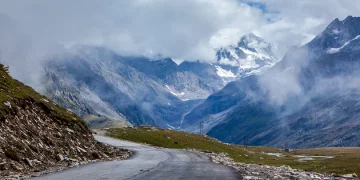
- OYO
 15 April, 2024
15 April, 2024 - Cultural Tour

- OYO
 15 April, 2024
15 April, 2024 - Cultural Tour

- OYO
 15 April, 2024
15 April, 2024 - Cultural Tour

- OYO
 15 April, 2024
15 April, 2024 - Cultural Tour

- OYO
 15 April, 2024
15 April, 2024 - Cultural Tour

Please rotate your device
Please go back to portrait mode for the best experience




 April 15, 2024
April 15, 2024 